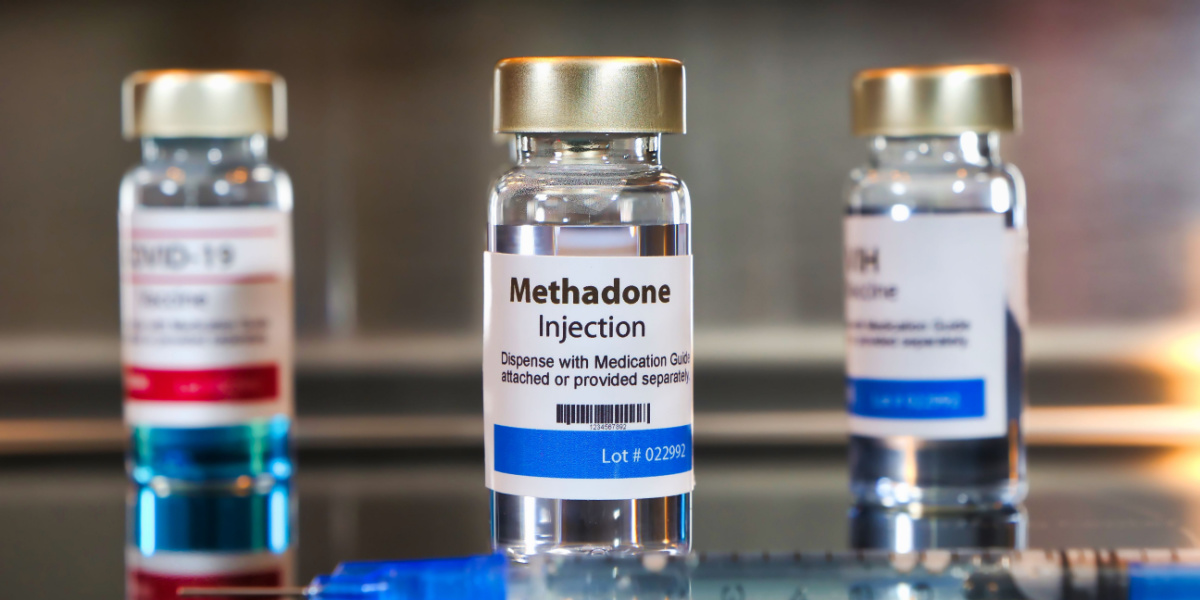Methadone is an opioid medication commonly used in the treatment of opioid use disorder. Methadone treatment can be provided via inpatient and outpatient facilities and can be used short-term or long-term for the detox or maintenance treatment of opioid use disorder.

What is methadone?
Methadone is an opioid medication, prescribed to treat opioid dependence or as an analgesic (pain relief). Methadone is taken as a tablet or a liquid solution and can only be obtained with a prescription from a medical professional.[1]
Methadone has been used as a treatment for opioid use disorder for several decades to reduce opioid use and withdrawal and prevent the harmful consequences of illicit opioid use. Methadone treatment can help reduce unsafe drug administration, such as injecting and sharing needles, decrease crime and arrests associated with drug seeking, and prevent overdoses and drug-related illnesses.[2][3]
How does methadone work?
Methadone is an opioid agonist that affects opioid receptors in the brain in the same way as heroin, morphine, and other opioids. This helps to reduce withdrawal symptoms and cravings that occur as a result of opioid dependence. However, methadone does not cause the same feeling of euphoria when taken at a therapeutic dose, reducing the potential for addiction and abuse.[3][4]
Methadone begins working within 30 minutes of administration and the effects can remain for 24-36 hours. As it is long-acting, it can be administered just once per day, or less often if appropriate.[2][5]
The long half-life of methadone helps prevent severe withdrawal symptoms and drug-seeking behaviors. This provides an opportunity for individuals who may be struggling with addiction to make positive life changes, improving their quality of life, physical and mental health, and overall functioning.[2]
Methadone side effects
Some people experience side effects with methadone treatment, although this is not always the case. If side effects are persistent or severe, it is recommended to contact the prescribing doctor.
Common side effects
Common side effects of methadone include:[1][2][5]
- Nausea
- Vomiting
- Constipation
- Stomach cramps or pain
- Insomnia or disturbed sleep
- Sweating
- Dry mouth
- Increase in appetite and weight
- Fatigue
- Dizziness
- Restlessness
- Mood changes
- Trouble concentrating
- Sexual dysfunction
Severe side effects
If any of the following side effects occur, contact a medical professional immediately:[1][4][5]
- Breathing difficulties
- Slow and shallow breaths
- Pain and tightness in the chest
- Rapid or irregular heartbeat
- Extreme drowsiness or loss of consciousness
- Hallucinations
- Confusion
- Severe dizziness or unsteadiness
- Fainting
- Seizures
- Rash or hives
- Swelling of the mouth or throat
- Fever
Issues relating to breathing are more likely to occur within 1-3 days of a new methadone treatment or dose increase. Because of this, individuals with a history of lung or breathing issues such as COPD or asthma may not be able to take methadone safely.[1]
Where to receive methadone treatment
While methadone is safer than heroin and illicit opioid use, it does still carry a risk for tolerance, dependence, addiction, abuse, and overdose. As such, it must be used exactly as prescribed and through a certified opioid treatment program. These treatments can be provided through inpatient or outpatient facilities.[4]
Inpatient
In many cases, individuals with opioid dependence will require inpatient treatment to begin a medical detox program. This often takes place within a specialized rehabilitation center, although may also be commenced in a hospital if an individual is admitted for opioid-related health issues.[6][7]
The individual will commence detox to reduce and stop their substance use. To help with this, methadone can be prescribed, as it can reduce withdrawal symptoms and cravings. In these facilities, professionals can monitor the individual, managing and treating withdrawal symptoms or other harmful effects that occur during detox.[7]
Outpatient
Outpatient methadone treatment is usually provided as a maintenance therapy following detox. This treatment is provided at methadone clinics, where individuals can receive their prescriptions. These clinics tend to be open and appropriately staffed every day of the week, allowing regular access to treatment.[2][7]
When individuals attend the clinic, they are monitored following medication administration for 15-20 minutes. This is to ensure their safety, monitor for signs of overdose, and ensure that medications are not misused or given to others.[2]
Dosing
Initially, methadone will be commenced at a low dose of between 10-30mg per day. This can then be increased gradually, every 3-7 days, to find the most effective therapeutic dose.[5]
A maintenance dose will prevent the occurrence of withdrawal symptoms without causing a feeling of euphoria or ‘high’. This dose can vary from person to person and may depend on the duration and amount of their substance use. A typical maintenance dose is between 60-120mg per day.[2]
Methadone safety
Prescription and administration
Methadone can only be prescribed by a doctor, who will assess the individual, plan their treatment, and conduct regular medication reviews where they make adjustments as required. It can only be administered by trained professionals via inpatient or outpatient treatment programs.[2][4]
In some cases, individuals may be provided with some medication that can be taken at home, if it is appropriate and safe for them to do so. In these cases, medication must be stored in a safe location where it cannot be accessed by others, particularly children. It must not be given to or shared with others and must be taken as prescribed.[4]
Pregnancy
Methadone can be safely taken while pregnant to treat opioid use disorder. This should be discussed with the prescribing doctor. The prescription and medical advice should be followed to prevent adverse effects.[5]
Overdose
In the event of a methadone overdose, call 911 immediately. Naloxone can be administered to treat an overdose and block the effects of the medication. Signs of a methadone overdose include slowed or stopped breathing, small pupils, seizures, cold and blue skin, and being unresponsive or unconscious.[1]
Contraindications
Other substances and medications can interact with methadone, causing an increase in effects and risks. Substances that are sedating and reduce the heart rate, such as other opioids, benzodiazepines, and alcohol, should not be taken with methadone, as there is an increased risk of breathing problems, coma, and death.[1][2]
Methadone treatment and long-term recovery
Methadone treatment can continue for several years as a long-term maintenance treatment for opioid use disorder. This will likely involve the individual attending a methadone clinic every day for their dose and regular appointments with their doctor to review their treatment and health.[7]
If the individual wishes to stop methadone treatment, the medication is no longer required or appropriate, and is deemed to be safe by a doctor, gradual tapering will commence. The tapering process will vary from person to person but could involve:[2]
- Reducing the daily dosage by 10mg every 1-2 weeks until reaching a daily dosage of 40mg
- Followed by reducing the daily dosage by 5mg every 1-2 weeks until reaching complete cessation
If withdrawal symptoms occur, reductions can be slowed or paused to allow for symptoms to alleviate. Individuals should be offered additional support throughout this time, to help manage the cessation process and any physical or psychological impact.[2][7]
Ongoing opioid use disorder treatment will often involve:[2][6][7]
- Psychotherapy: Psychological interventions can help treat comorbid mental health conditions, such as depression and anxiety, provide treatment and coping strategies for any emotional distress or past trauma that has contributed to substance use, and help with recovery, abstinence, and relapse prevention.
- Medication: Some individuals may require long-term methadone treatment or other medications to manage opioid use disorder.
- Social intervention: Professionals, such as social workers, can assist in matters relating to housing, finances, social support, and employment skills or opportunities.
- Support: Many individuals benefit from attending support groups, meetings, or 12-step programs to help in their recovery and relapse prevention.
- Holistic therapies: Holistic approaches such as nutrition, exercise, mindfulness, and healthy lifestyle choices can improve physical and mental well-being and be beneficial to the recovery process.





